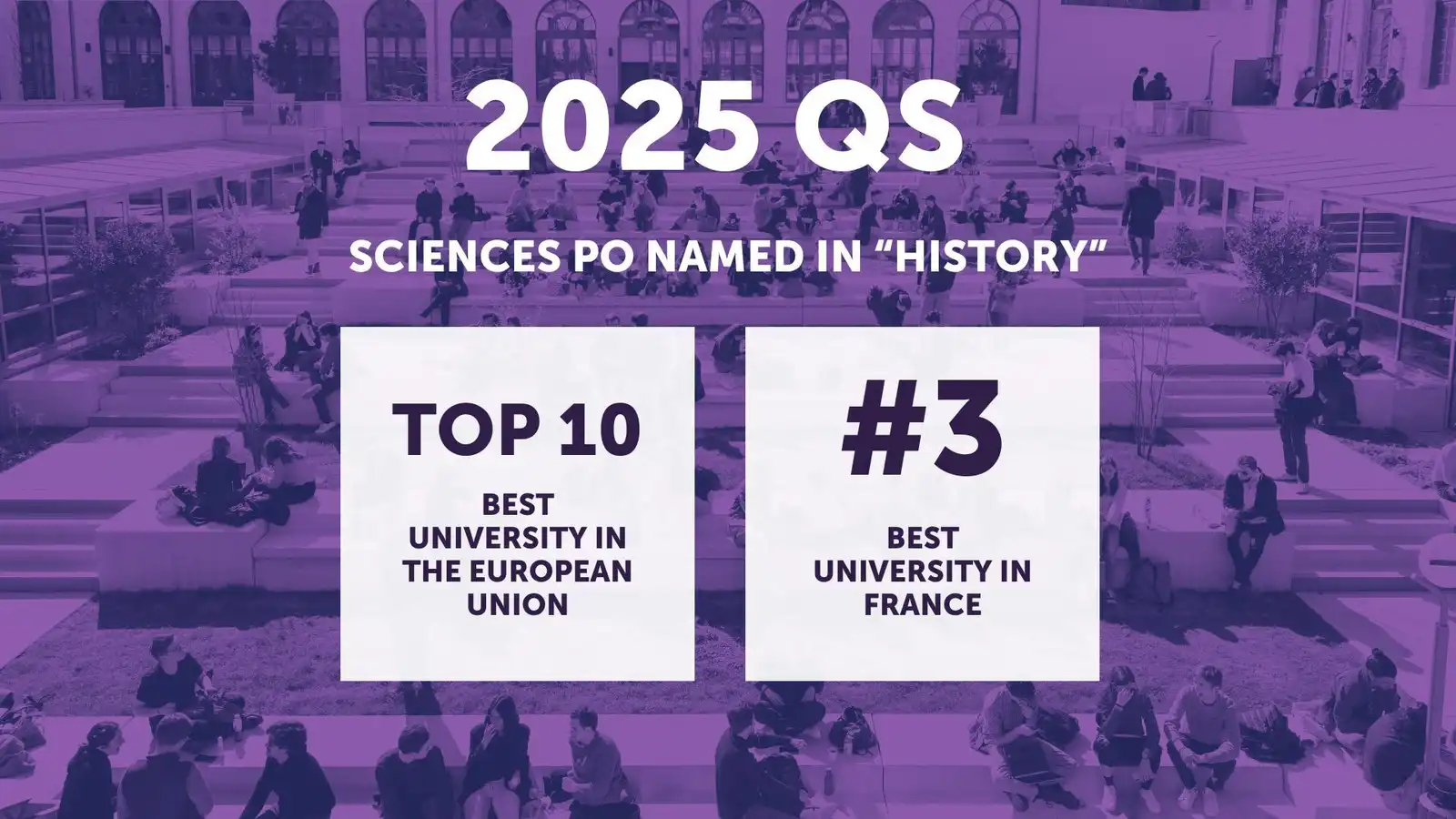
Home>Academics>Master's Programmes>Master in History
Master in History
Two-year Master's
Programme in French
120 ECTS minimum
Presentation

The Master's in history offers training that includes the following elements:
- High-level theoretical and methodological training that teaches inquiry and research processes;
- Specialization in more specific areas and subjects: a broad range of history specialties, research subjects and advanced methods;
- A research thesis that forms a central element of the training, with a topic that is gradually defined during the first year through a continuous, interactive relationship between the student and teaching body.
Objectives
The program is for students seeking careers in teaching and research, as well as those interested in other sectors: public service, heritage, libraries and archives, the private sector, especially the cultural and audiovisual industries, publishing, press, media and associations.
See the interview with Marion Fontaine, Head of doctoral studies in History
Skills targeted
The program offers excellent training in contemporary history that provides the following skills: documentary research, critical thinking development, definition of research problems, rigorous presentation of results, command of the literature.
Structure of the Program
A mandatory historiography seminar taught by all members of the teaching staff is offered beginning in M1.
Specialized courses delve into more specific areas and subjects: a wide array of historical specialties; cutting-edge research topics; methods (statistics, images, oral history, archives). These teachings focus on practice through the presentation of on-going research, and sometimes the implementation of surveys.
Significant weight is given to the research paper. Its topic is gradually defined during M1 through continuous interaction between the student and teaching staff.
Recommended reading list for history graduate students
- Marc Bloch, Apologie pour l'histoire ou métier d'historien, Paris, Armand Colin, 1ère éd. 1949.
- Alain Boureau et Daniel Milo (éd.), Alter-histoire, essais d'histoire expérimentale, Les Belles Lettres, 2e éd 2005.
- E.H. Carr, Qu'est-ce que l'histoire?, La Découverte, 1988.
- Roger Chartier, Au bord de la falaise, l'histoire entre certitudes et inquiétude, Albin Michel, 2009.
- Michel de Certeau, L'écriture de l'histoire, Gallimard, 1975.
- Laura Downs, Writing Gender History, 2e ed, Bloomsbury Press, 2010.
- Richard Evans, In Defense of History,New York, Norton, 1999.
- François Furet, L'Atelier de l'histoire, Gallimard, 2007.
- François Hartog, Régimes d'historicité : présentisme et expérience du temps, Seuil, Points-Histoire, 2012.
- Sebastian Jobs & Alf Lüdtke, Unsettling history: archiving and narrating in historiography, Francfort, Campus, 2010.
- Reinhart Koselleck, L'expérience de l'histoire, Seuil, Points-Histoire, 2011.
- Alf Lüdtke, L'Histoire du quotidien, Paris, Eds de la Maison de Sciences de l'Homme, 1994.
- Henri-Irénée Marrou, De la connaissance historique, Seuil, Points-Histoire, 1ère éd. 1954.
- Philippe Poirrier, Les Enjeux de l'histoire culturelle, Seuil, Points-Histoire, 2004.
- Antoine Prost, Douze leçons sur l'histoire, Seuil, Points-Histoire, 1996.
- Sanjay Subrahmaniam et al., Texture du temps. Écrire l'histoire en Inde, Seuil, 2006.
- Paul Veyne, Comment on écrit l'histoire. Essai d'épistémologie, Seuil, Points-Histoire, 1ère éd. 1970.
- Yosef Hayim Yerushalmi, Zakhor. Histoire juive et mémoire juive, Gallimard, coll. Tel, 1991.
- Serge Berstein, Pierre Milza (eds), Axes et méthodes de l'histoire politique, Paris, PUF, 1998.
- Pierre Nora (dir.), Les lieux de mémoire, vol. 1, La République, Gallimard.
- René Rémond, Pour une histoire politique, Seuil, Points-Histoire, 1988.
- Pierre Rosanvallon, Pour une histoire conceptuelle du politique, Gallimard, 2003.
- Maurice Agulhon, Histoire vagabonde, Gallimard, 1988.
- Christopher Bayly, La naissance du monde moderne (1780-1914), Paris, 2007.
- Laurence Fontaine, L'économie morale : pauvreté, crédit et confiance dans l'Europe pré-industrielle, Paris, Gallimard, 2008.
- Mark Mazower, Le Continent des ténèbres. Une histoire de l'Europe au XXe siècle, Complexe, 2005.
- Arno Mayer, La persistance de l'Ancien Régime. L'Europe de 1848 à la Grande Guerre, éd. Champs-Flammarion 1990.
- Daniel Roche, La France des Lumières, Fayard, 1995.
- Edward Said, L'Orientalisme : l'Orient créé par l'Occident, Seuil, 1ère éd. 1978.
- Maurice Agulhon, La République au village. Les populations du Var, de la Révolution à la II° République, Seuil, 1979.
- Alain Corbin, Le village des cannibales, Aubier, 1990.
- Alain Dewerpe, Charonne, 8 février 1962 : anthropologie historique d'un massacre d'État, Gallimard, coll. « Folio », 2006.
- Ute Frevert, Emotions in History. Lost and Found, Budapest – New York : Central European University Press, 2011
- Carlo Ginzburg, Le Fromage et les vers : l'univers d'un meunier du XVIe siècle, Flammarion, 1980
- Dagmar Herzog, Sex after Fascism. Memory and Morality in Twentieth-Century Germany, Princeton University Press, Princeton (NJ), 2005.
- Giovanni Levi, Le pouvoir au village, Gallimard, 1989.
- Daniel Milo, Trahir le temps. Histoire, Hachette-Pluriel, 1997.
- Claude Nicolet, L'Idée républicaine en France, Gallimard.
- Drew Gilpin Paust, This Republic of Suffering. Death and American Civil War, New York : Vintage, 2008
- Antoine Prost & Jay Winter, Penser la Grande Guerre. Un essai d'historiographie, Seuil, Points-Histoire, 2004
- Timothy Tackett, « Par la volonté du peuple » : comment les députés de 1789 sont devenus révolutionnaires, Albin Michel, 1997.
- Edward P. Thompson, Customs in Common : Studies in Traditional Popular Culture, Penguin Books, 1ère ed. 1991.
Thematic guide History
Do you need information on the history databases and collections at the Sciences Po library?
Muriel DENNEFELD
01 45 49 51 78
Visits :
Thursday 9am-10.30am Saint-Thomas - Research library
See the History Guide
Teaching staff
Teachers from the Permanent Faculty within the Center for History of SciencesPo.
Guest teachers:
- Jean Baptiste CLAIS, Conservateur du patrimoine, Chargé de mission veille technologique
- Emmanuel Blanchard, Historien et réalisateur de documentaires d'histoire
- Emmanuel Laurentin, journaliste et producteur à France Culture
Contacts
Marion Fontaine
Head of doctoral studies in History, Full Professor at Sciences Po
Contact us by e-mail or telephone to make an appointment:
Clémentine Scott
Administrative Officer
Tél : +33 (0)1 45 49 59 23